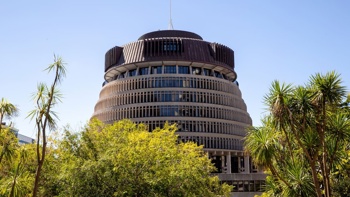Incoming Prime Minister Christopher Luxon says he and other party leaders are in the “final stages of our coalition conversations”.
“We’ve agreed, fully, a policy program. We’ve also agreed the processes and ways of working as a government and largely through ministerial positions,” he told reporters outside his Auckland home this afternoon.
Luxon said there were still a couple of issues to work out and the role of deputy prime minister was an example.
“Those are conversations that I have privately with the leaders.”
The contest for deputy prime minister is now between NZ First leader Winston Peters and Act leader David Seymour – Nicola Willis is not in the frame for the role.
The deputy PM’s role remains one of the few issues holding up the completion of talks, as MPs return to Wellington ready for caucus meetings to approve the deals their parties have signed.
However, Nicola Willis told the Herald she was “not in the race.”
It is understood Willis’ view is that it is up to Luxon to choose the deputy and she had made clear to him that she did not have any expectation of getting it. Luxon has made it clear she would be finance minister.
Luxon said of Willis ruling herself out from the deputy PM role: “It had never been a consideration for Nicola. [She] and I had both spoken well before the negotiation and of the view that, frankly, given our past convention, that deputy prime ministership is a role that should be held by coalition leaders.”
He refused to go into detail about negotiations over deputy PM.
“I think we’ve made tremendous progress.”
/cloudfront-ap-southeast-2.images.arcpublishing.com/nzme/CHLPPT2HU5FEVLAQIJXR2W4LZE.jpg)
Incoming Prime Minister and National leader Christopher Luxon speaking to media in Auckland today. Photo / Alex Burton
Luxon said the talks in general would “take as long as it takes”.
“Largely, we’ve agreed our ministerial responsibilities and appointments and that’s in good shape,” he said.
“Again, a couple of issues to work out.”
Luxon said the three parties are “very aligned around the goals of how to take this country forward”.
“As I’ve said before, within each of the three parties there is incredible talent, there is a real mixture of skills, abilities and experiences. And as the prime minister, I want to be able to use all of that talent and put the right people on the right assignments to go and get the job done.”
Luxon said he had enjoyed working with both Seymour and Peters.
“In the process [of coalition talks], you actually get to know each other very well.”
“There’s no one holding the country to ransom. I’m trying to get people to understand that in an MMP process, it requires some maturity.”
“All of us want to get this wrapped up. Ten months to get a government formed in the Netherlands with a similar system? I think we’re doing pretty well.”
Luxon said conversations would continue tonight, “and if we have to into tomorrow and as long as we have to, quite frankly”.
He said he wouldn’t return to Wellington until a deal was cut.
The signs point to the deputy prime minister’s position being offered to Peters, who is understood to have included in it his list of requests.
However, Seymour has fought back over that publicly, saying in his view it should go to the second biggest party in the coalition. His public statement appeared to take the other parties by surprise.
On the potential for co-deputy PMs, Luxon said: “There’s obviously been a number of options and conversations taking place, presented and discussed, but I’ll keep that in the room.”
Seymour said today that the allocation of ministerial roles was still in negotiations.
With Willis ruling her out, the spotlight falls to the two remaining candidates: Seymour and Peters.
Senior NZ First MP Shane Jones would not say whether his boss had been offered the top job, but answered with a phrase from the bible.
”It’s biblical, ‘The first shall be last and the last first, for many are called but few are chosen’” Jones said.
The quip is from Matthew 20:16, and is actually the wrong way round. It should be: “The last will be first, and the first last”.
Does Jones mean that NZ First, being the smallest party in the new government, will be “first” in the sense that it gets the deputy job over Seymour and Act? The typical interpretation of the phrase is that all believers are rewarded with eternal life. That could mean a new style of co-deputy role.
Senior party members return to Wellington
Willis and Hutt South MP Chris Bishop returned to Wellington as a coalition deal beckons.
Willis said she hoped the three parties were close to a deal, however, her more immediate focus was going home to see her four children who she had seen sparingly in recent weeks.
Bishop, arriving in one of Christopher Luxon’s shirts, said he had run out of clothes but also was looking forward to seeing his family.
Willis confirmed there was no caucus meeting planned for National today, but said there would likely be discussions via phone this evening.
Bishop, who could take on the Leader of the House role in the next Government, ruled out the House returning next week.
“It’s all a bit in flux but it won’t be for some days.
“There are a variety of things that have to happen for the house to sit. It won’t be next week.”
Bishop wouldn’t answer whether he’d been given ministerial portfolios yet and wouldn’t speculate on when a deal might be reached.
While National leader Christopher Luxon and Act leader David Seymour are both still in Auckland.
NZ First’s Shane Jones is also expected to arrive in Wellington today and most other NZ First MPs are already in Wellington. NZ First leader Peters is also understood to be planning to travel to Wellington at some point soon.
However, there are still some final details of the deal to be resolved around the appointments of ministers, including the deputy prime minister.
Luxon and Seymour are expected to talk further after their meeting yesterday, at which Seymour made it clear he expected more ministerial appointments, given Act had a higher share of the vote than NZ First - and also set that out as a reason for Act to get the deputy prime minister’s role.
While Seymour has completed his consultation with the Act board, he is yet to call a caucus meeting - that won’t happen until the final deal is ready to sign.
Seymour told the Herald late last night that, barring any major last-minute changes, he would not need to go back to them.
However, Act’s caucus meeting will wait until the deal is ready to be signed, and that would require ministerial posts to be agreed on.
It’s understood all parts of the deals are now complete, other than ongoing wrangling over ministerial portfolios. The final negotiating points are understood to include the number of portfolios the smaller parties are getting and the areas they are in.
The deputy prime minister role is among them - and yesterday Seymour made it clear that he thought he had the better claim for that job. He also made it clear that he expected Act to get more ministerial roles than NZ First, given its election result was better.
The leaders are in Auckland today where more talks are expected to be held. They will then travel to Wellington to announce and sign the deal. The timing of that could be affected by the weather. Fog in Wellington yesterday has disrupted flights.
However, the MPs of all parties are on standby and waiting to be called to meet to agree on the deals. That has to happen before they are signed.
/cloudfront-ap-southeast-2.images.arcpublishing.com/nzme/AK7ZHAHDDVAVTEQILADJBV6C5I.jpg)
New Zealand First Party leader Winston Peters and chief of staff Darroch Ball leave the Cordis Hotel yesterday after talks with National's Christopher Luxon. Photo / Dean Purcell
Seymour’s open pitch for the deputy PM role appeared to take National and NZ First by surprise.
It is also understood other ministerial positions are proving sticking points. While the parties have agreed on the policy platform, who will lead some of the more contentious areas, such as work around the Treaty of Waitangi, are taking more work.
All three parties have issues to address about the way the Treaty is treated in legislation, the debate required over the principles of the Treaty, the direction being taken by the public service and related issues such as the naming of government departments.
/cloudfront-ap-southeast-2.images.arcpublishing.com/nzme/6SRWOG73C5G6RIQDXTHZSJUDXA.jpg)
National leader Christopher Luxon arrives at the Cordis Hotel in Auckland for ongoing coalition talks with NZ First leader Winston Peters. Photo / Michael Craig
Issues include whether to keep the Office for Māori Crown Relations - Te Arawhiti as it stands and who will lead that work.
It was “quite possible” Act would want responsibility in the Treaty of Waitangi space, Seymour said.
Peters would not answer questions about the deputy job when he left the Cordis Hotel in Auckland yesterday, after meeting with Luxon.
Previously, Peters and Seymour have stated policy was more important to them than ministerial positions.
“Act has always said that policies for people are more important than positions for politicians,” Seymour said on Thursday last week.
/cloudfront-ap-southeast-2.images.arcpublishing.com/nzme/7JHQ62VNJVFAFJOWXRCGT7AKVE.png)
David Seymour leaves a meeting at Christopher Luxon's house. Photo / RNZ
National having wrapped up policy agreements ahead of discussing those positions could help its case as Seymour and Peters would be going back on their word if they dig their heels in too much.
Yesterday, Luxon was clearly unimpressed with Seymour’s apparent public pitch for the deputy role, turning Seymour’s own earlier reference to Weet-Bix back on him.
Seymour said Luxon had clearly had one too many Weet-Bix after Luxon stated that the policy talks between National and the two smaller parties were completed.
On Seymour’s public airing of the deputy prime minister claim, Luxon said “he probably got up and ate a lot of Weet-Bix this morning”, before saying all parties had agreed to keep talks confidential.
Luxon appeared to downplay the position, saying it was still up for negotiation and adding he thought it was largely “ceremonial”.
The exact form of the new government also appears to be in the balance, with Luxon yesterday declining to answer questions about if a formal three-party coalition was on the cards or another arrangement. It is also unclear if there will be one agreement between the parties or separate agreements.
Seymour has previously said he could sit on the cross-benches if Act didn’t get its way.
“Irrespective of format, what’s obvious is all three parties need to work together,” Luxon said.
“And there are pros and cons of lots of different arrangements.”
Take your Radio, Podcasts and Music with you









